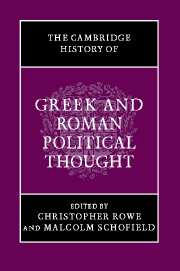Book contents
- Frontmatter
- Introduction
- PART I ARCHAIC AND CLASSICAL GREECE
- 1 Greek political thought: the historical context
- THE BEGINNINGS
- 2 Poets, lawgivers, and the beginnings of political reflection in archaic Greece
- 3 Greek drama and political theory
- 4 Herodotus, Thucydides and the sophists
- 5 Democritus
- 6 The Orators
- 7 Xenophon and Isocrates
- 8 Socrates and Plato: an introduction
- 9 Socrates
- 10 Approaching the Republic
- 11 The Politicus and other dialogues
- 12 The Laws
- 13 Plato and practical politics
- 14 Cleitophon and Minos
- ARISTOTLE
- PART II THE HELLENISTIC AND ROMAN WORLDS
- Epilogue
- Bibliographies
- Index
- Map 1. Greece in the fifth century bc"
- References
12 - The Laws
from THE BEGINNINGS
Published online by Cambridge University Press: 28 March 2008
- Frontmatter
- Introduction
- PART I ARCHAIC AND CLASSICAL GREECE
- 1 Greek political thought: the historical context
- THE BEGINNINGS
- 2 Poets, lawgivers, and the beginnings of political reflection in archaic Greece
- 3 Greek drama and political theory
- 4 Herodotus, Thucydides and the sophists
- 5 Democritus
- 6 The Orators
- 7 Xenophon and Isocrates
- 8 Socrates and Plato: an introduction
- 9 Socrates
- 10 Approaching the Republic
- 11 The Politicus and other dialogues
- 12 The Laws
- 13 Plato and practical politics
- 14 Cleitophon and Minos
- ARISTOTLE
- PART II THE HELLENISTIC AND ROMAN WORLDS
- Epilogue
- Bibliographies
- Index
- Map 1. Greece in the fifth century bc"
- References
Summary
A singular work
The Laws can be considered the first work of genuine political philosophy in the Western tradition. Admittedly it was conceived within an already complex tradition of philosophical legislation and speculative constructions, in which the Republic holds an important place. But so far as we can judge, the Laws’ combination of an investigation into the foundations of legislation with the concrete elaboration of detailed laws is without precedent. From this point of view, the Republic is at best a sketch, whereas the Laws breaks ground for future political thought.
Part of the work’s importance lies in its having created a new genre, or rather two, by combining two approaches which posterity would come to distinguish. The Laws is at once an exposition of political principles (comparable to Rousseau’s Social Contract or Hegel’s Principles of the Philosophy of Right), and a treatise of applied legislation (comparable to the Project for the Constitution of Corsica or the proposal for a German Constitution). Moreover, several concepts elaborated in the Laws have proved of lasting value to political philosophy. The so-called principle of Lord Acton, that absolute power corrupts absolutely, is already formulated in the Laws. More positive philosophical ideas first articulated in the Laws include the ‘mixed constitution’, the ‘rule of law’, and last but not least the ‘legislative preamble’. Plato himself presents this last item as his greatest legislative innovation (722e1–4).
- Type
- Chapter
- Information
- The Cambridge History of Greek and Roman Political Thought , pp. 258 - 292Publisher: Cambridge University PressPrint publication year: 2000
References
- 17
- Cited by

